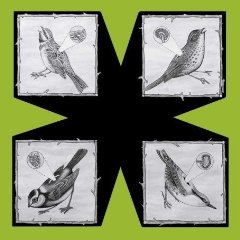Let’s start with the name. North Sea Radio Orchestra has to be one of the most evocative monikers in recent years, conjuring up all kinds of images, ideas and emotions – incurably romantic. This romance aims much farther than a pleasing title though. As on their eponymous 2006 debut, the group draw on English poetry for lyrical inspiration. On Birds there are three pieces by William Blake (‘The Angel’, ‘A Poison Tree’ and ‘The Wound’), one by Chaucer (‘Now Welcom Somer’) and one by Tennyson (‘Move Eastward Happy Earth’). Then there’s the music: made up of classical and acoustic guitars, chamber organ, many solo voices, piano, various woodwind instruments, percussion and violin, North Sea Radio Orchestra couldn’t sound more out of time. This is not to say that they feel dated, it’s just peculiarly not now. But this isn’t so simple either, as there is a feeling within the music that could only come from now. Despite their entirely non-rockist existence, it’s their ability to bend their compositions into song form that see them being praised to the heavens.
And if there is ever a whiff of austerity, its counterbalanced by the sheer listenability of the music. You could play this to the family on Christmas Day and everyone would probably love it. Equally, I don’t think I’ve ever heard such unforced music – no matter what conceptual considerations might have gone into this, it just sounds so… natural.
But equally, English ‘tradition’ has never been more prominent than now. Ghost Box and the whole Hauntology genre, the newly-reissued Robert Wyatt and a heightened interest in obscure folk make North Sea Radio Orchestra a lot less anachronistic than they might have done a few years ago. Yet tradition is warped a lot more obviously by those mentioned above. The North Sea Radio Orchestra are certainly original, but their twists in England’s fabric are blessed with far more subtle.
‘The Angel’ and ‘Poison Tree’ are duets between founder composer James Fortnam on guitar and his wife Sarah on vocals. Her voice is an incredible instrument- soaring, strong but never histrionic- she uses it to deliver the words with clear passion. Copt Gilders strays into Penguin Café Orchestra territory which is a useful comparison for the more upbeat songs that employ the full orchestra- busy and strongly melodic, complex but not complicated. ‘Move Eastward’, ‘Happy Earth’ and ‘Now Welcome Somer’ utilise the voices of the whole chorus for particularly goosepimply moments with layers of sublime vocal harmony, awe-inspiring in its softness. However, undoubted highlight of the album is ‘The Wound’ which features a rolling piano and sublimely meandering toy town organ. Once Sarah’s voice kicks in it effortlessly carries you of your head to a temporal idyll where you can lie in the sun captivated by passing clouds.
North Sea Radio Orchestra have at times been charged with a certain amount of bourgeois smugness and and also of being fluffy and twee. OK, so they’re not The Bug. But there is a passion and musical ambition here that is entirely lacking in much contemporary guitar music. Instead, this group offer ready comparison to the Hauntology aesthetic, where the exploration of tradition also undergoes a radical mutation. Yet perhaps this misses the point. Birds is a unique 40 minutes – captivating, beautiful, peaceful and thoughtful. It’s seemingly so far removed from most people’s experience of everyday life that it can’t but help transport you elsewhere – it floods your mind eye with a pollution-free rolling green world and entirely resets the rhythm of your day. How could that not be worth exposing yourself to?


